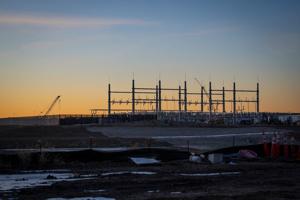Science
Data Centers Drive Economic Growth in Rural Communities

Data centers are increasingly recognized as vital components of modern economies, particularly in rural areas. Rather than merely being viewed as large facilities consuming excessive electricity and water, these centers serve as the backbone of the digital economy, fostering diverse and resilient local economies. As cities and towns navigate the future, data centers can play a pivotal role in their development.
Understanding the impact of data centers requires recognizing their function in everyday life. When individuals search for recipes, access cloud files, or use services like ChatGPT, they are utilizing a vast network of computers housed in data centers. These facilities enable quick access to information, significantly enhancing the user experience across various platforms.
Rural America stands to benefit significantly from the data center boom. Typically, these large facilities require substantial space but also need to be near population centers to reduce latency—the delay in data transfer. This combination has made areas just outside metropolitan regions attractive for development. As a result, rural counties previously reliant on agriculture and resource extraction can discover a new source of tax revenue and infrastructure investment through data centers.
While data centers do not generate as many onsite jobs as traditional manufacturing plants, their economic influence is profound. They support a myriad of jobs across industries, including development, cybersecurity, and logistics. The presence of data centers anchors countless employment opportunities in various sectors that rely on continuous data processing.
The fiscal advantages of data centers can be substantial. When combined with sound local budgeting and planning, towns can harness data center investments to maintain low taxes and improve infrastructure. For instance, facilities in Loudoun County, Virginia, contribute $26 in tax revenue for every $1 spent on public services, providing essential support for schools and community development.
A common misperception in discussions about data centers is the comparison of their resource use to that of residential homes. Such comparisons often lack context and can be misleading. Industrial facilities, by nature, consume more resources than homes. When evaluating their water and energy consumption, the figures are not as alarming as some reports suggest. According to projections from the Department of Energy, data centers could potentially triple their electricity usage by 2028. Even under this projection, their water consumption would equate to that used for irrigating approximately 260 square miles of corn, representing about 1 percent of total corn irrigation in the United States.
Moreover, data center companies have committed to sustainability efforts, including replenishing the water they consume. Major tech firms, including Microsoft, are actively involved in expanding local energy generation capacity. In 2016, Microsoft financed a natural gas plant for reliability and entered contracts with nearby wind farms, enhancing regional energy availability and supporting the local grid.
Data centers represent more than just technological infrastructure; they are essential to the functioning of various sectors, from healthcare to finance and entertainment. For communities considering their economic futures, welcoming data centers signals a commitment to harnessing the infrastructure that will drive growth in the coming years. The challenge for local leaders is to seize the opportunity to ensure that their communities reap the benefits of this evolving landscape.
As Josh T. Smith, Energy Policy Lead for the Abundance Institute, notes in a guide released in July 2023, the potential for growth and innovation linked to data centers is vast. Communities that understand and embrace this opportunity can position themselves at the forefront of economic advancement.
-

 Top Stories2 weeks ago
Top Stories2 weeks agoMarc Buoniconti’s Legacy: 40 Years Later, Lives Transformed
-

 Health3 weeks ago
Health3 weeks agoInnovative Surgery Restores Confidence for Breast Cancer Patients
-

 Sports4 weeks ago
Sports4 weeks agoSteve Kerr Supports Jonathan Kuminga After Ejection in Preseason Game
-

 Top Stories2 weeks ago
Top Stories2 weeks agoBOYNEXTDOOR’s Jaehyun Faces Backlash Amid BTS-TWICE Controversy
-

 Science4 weeks ago
Science4 weeks agoChicago’s Viral ‘Rat Hole’ Likely Created by Squirrel, Study Reveals
-

 Lifestyle4 weeks ago
Lifestyle4 weeks agoKelsea Ballerini Launches ‘Burn the Baggage’ Candle with Ranger Station
-

 Politics4 weeks ago
Politics4 weeks agoDallin H. Oaks Assumes Leadership of Latter-day Saints Church
-

 Entertainment4 weeks ago
Entertainment4 weeks agoZoe Saldana Advocates for James Cameron’s Avatar Documentary
-

 Business4 weeks ago
Business4 weeks agoTyler Technologies Set to Reveal Q3 2025 Earnings on October 22
-

 Lifestyle4 weeks ago
Lifestyle4 weeks agoDua Lipa Celebrates Passing GCSE Spanish During World Tour
-

 Health4 weeks ago
Health4 weeks agoCommunity Unites for Seventh Annual Mental Health Awareness Walk
-

 Business3 weeks ago
Business3 weeks agoZacks Research Downgrades Equinox Gold to Strong Sell Rating









